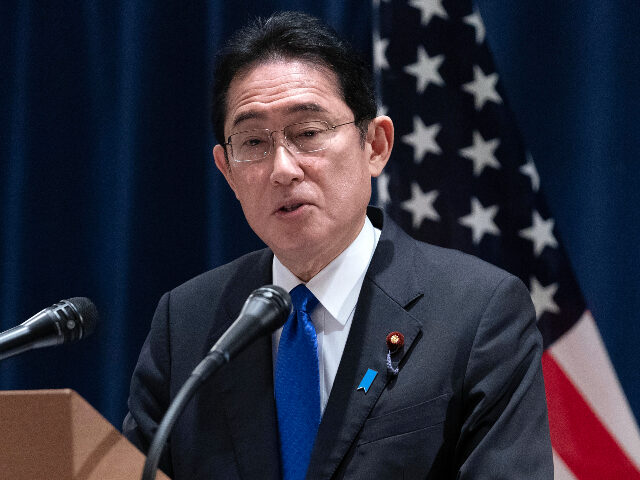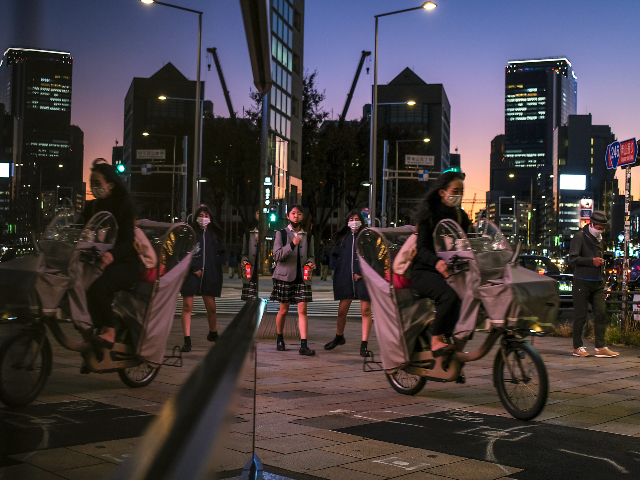Japanese Prime Minister Kishida Fumio told his parliament on Monday that reversing Japan’s demographic death spiral is a top priority for his administration.
“Our nation is on the cusp of whether it can maintain its societal functions. It is now or never when it comes to policies regarding births and child-rearing – it is an issue that simply cannot wait any longer,” Kishida said.
The prime minister said he would propose doubling the budget for child-related issues and creating a new government agency for children and families. Kishida explained these proposals would address the extremely high cost of raising children in Japan, which is exceeded only by the cost of raising children in China and South Korea, both of which are experiencing their own demographic problems.
Last week, China reported its first net population decline since the mid-20th Century famines caused by the policies of Chinese Communist Party founder Mao Zedong. The new demographic crisis in China was also caused by idiotic and inhumane Communist policy, namely the monstrous “One Child” forced-abortion population control scheme.
China ended One Child years ago and has lately been encouraging its citizens to have more children, but the population decline triggered by the older policies is proving very difficult to reverse, especially since it produced a shortage of young women.
Modern China is encountering some of the same demographic problems experienced by Japan, and in a somewhat less severe fashion by most of the industrialized world. As Kishida indicated in his policy speech, child care becomes expensive in advanced economies with high standards of living, and it is an expense that career-minded young professionals are unwilling to bear.
Healthy population growth requires a considerable number of families with two or more children, which usually requires couples to marry and begin raising children at a relatively young age. Educated women working on their careers are more likely to view child-rearing as a difficult and expensive endeavor that should be delayed until they reach a comfortable middle age – and it takes longer to reach that financial comfort zone when ambitious young professionals migrate to increasingly expensive cities.
Japan’s population began declining sharply in 2010, after a decade of hovering at nearly zero net growth. Demographers predict Japan’s population will contract by an astonishing 30 percent by 2065 if current trends continue.
The most significant of those trends is the collapse of marriage in Japan. Japanese women have very few children out of wedlock, and they are putting off wedlock until their 30s and 40s as they earn more college degrees and pursue higher-paying careers. One reason this trend is so pronounced in Japan is cultural: wives are expected to handle a larger share of domestic duties than in most other societies, so the “cost” of marriage and family to a young professional woman is much higher.
The Japanese government tried to address these trends by offering more financial assistance for child-rearing in the 1990s, but it clearly did not work, perhaps because the monetary cost of bearing and raising children is only part of the total “cost” young women perceive.
Kishida noted on Monday that births in Japan fell below 800,000 in 2022, reaching that landmark of decline fully eight years ahead of projections. As with other wealthy nations, this will result in a shortage of workers, and a shortage of young taxpayers to cover the cost of retirement and medical care for the elderly.
Japan’s working-age population declined by 11 million last year, while the over-65 population increased by 14 million – an unsustainable demographic shift that occurs when people live longer, while the generation of young workers who were supposed to take care of them was never born. The Japanese have the longest life expectancies in the world, and it is killing them.
The East Asia Forum argued in 2022 that the cost of raising children is not the biggest obstacle to reversing Japan’s demographic decline, so Kishida’s proposals will probably generate a very marginal gain for each new dollar spent.
In addition to women not wishing to compromise their career plans by marrying young, the East Asia Forum pointed to research that said Japanese young people remain quite interested in getting married, but they have a great deal of difficulty finding suitable mates.
To put it bluntly, as young Japanese women earn more and raise their lifestyle expectations, they have difficulty meeting even more successful men who seem like good marriage prospects:
A possible factor for the reluctance of Japanese women to marry is the increasing ‘opportunity costs’ of marriage. With higher education, more young women have similar wages to men, so their average search period for spouses is longer. Currently, the average age of first marriage for women is 29 years by the Cabinet Statistical Office, well beyond the 25 years in the 1980s — when most women were only high school graduates.
The option to live alone in large cities and avoid the constraints of a traditional family has also become more appealing. In Japan, marriage is not necessarily based on consent between a couple but is a unification of two families. Women married to the eldest sons are expected to care for their husband’s parents. This is a significant burden for women who want to pursue their professional careers.
Another example of a family constraint is that a married woman is expected to take her husband’s surname. Japanese law requires married couples to adopt the same surname, and while it does not stipulate which name, over 90 per cent of women take their husband’s name. This is disadvantageous to an increasing number of married women with official qualifications or established careers using their maiden name. Yet the proposal for the optional use of a maiden name has not been allowed because of the conservative logic that such a couple may lack a family tie and have a negative influence on their children.
Population experts believe there are few government policies that can arrest severe demographic decline. In Japan, young women clearly appreciate the value of marriage – they simply have logical reasons for delaying marriage until after their reproductive prime, and not many suitors can offer the economic and social incentives that would lead women to change their calculations. Everyone is acting sensibly, and the result is a looming disaster.
Japan has resisted addressing that disaster through mass immigration, as do most other Asian countries. In a rather sour post-mortem last weekend for Japan that listed the cause of death as strangulation by a hidebound patriarchy, the BBC chided the Japanese for becoming even more closed to the outside world as they teeter on the brink of demographic collapse. Entire villages are becoming ghost towns, inhabited only by a few caretakers who keep things running as government make-work projects.
The BBC sneered at “right-wingers” who admire the Japanese for resisting mass migration, but as a simple matter of logic, importing someone else to live in Japan would do nothing to address the demographic problems of the Japanese. In fact, it could make them worse by increasing the cost of living and depressing wages so that even fewer Japanese couples decide to marry and raise children while they are still young.
As the BBC admitted, there are more foreign nationals living in Japan than many outsiders think, but they tend to come from other nations with demographic problems of their own, namely the Asian economic superpowers, Europe, and America. It seems unlikely that Japan could reverse its decline by importing more people from societies with less-severe versions of the same problem Japan has.
The UK Guardian noted on Sunday that a great deal of the world is developing that aging-demographic problem, including even populous nations like India, where “parts of its more prosperous south” are “already graying.”
India’s coastal state of Kerala has a particularly large surplus of older people because families from other parts of the country are dropping their aging parents and grandparents there. Keralan officials are planning to address that problem by deporting impoverished old people back to their states of origin and seizing property from families that refuse to care for their elderly.
“The challenges facing Kerala and Japan are increasingly common across much of the world, where families are getting smaller, and people are living longer,” the Guardian noted, quoting analysts who say that by the middle of this century, most of the countries that still have growing and youthful populations will be located in sub-Saharan Africa.


COMMENTS
Please let us know if you're having issues with commenting.